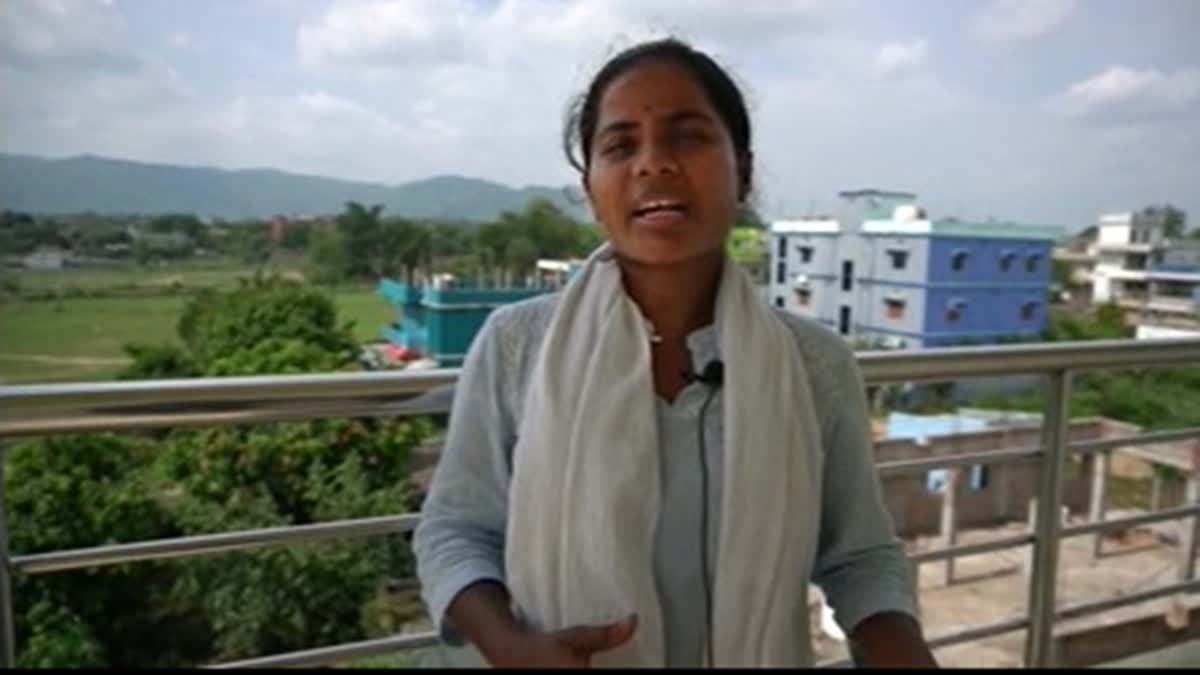Malkangiri: In an inspiring story, a tribal woman from Odisha's Malkangiri has broken the shackles of illiteracy and backwardness and made it to the Forbes India’s W-Power 2024 list for her contribution in the field of journalism.
Jayanti Buruda is the first tribal from Odisha to make it to elite list. Being the first woman journalist of her district, Jayanti imparts training to tribal women of her district on journalistic practices such as writing scripts, preparing field reports, and shooting and editing videos. Besides, she has carved a niche as a social worker by founding organisations like Jungle Rani and Bada Didi Union that work on girls’ education and sexual and reproductive health.
Jayanti shared her challenging journey from being the first Adivasi girl to study and become a journalist to receiving the NWMI Fellowship for Women Journalists.
Jayanti has established a 'Pad bank' in various villages to help women during menstrual periods and ensure the menstrual hygiene among women. In 2017, with 20 educated young women Jayanti create a team 'Bada Didi', which went to various villages of remote Banda ghati and explained to the young women about the use of sanitary pads.
Hailing from Serpali, Jayanti’s journey was not easy at all. While she wanted to create her identity as a journalist, her parents were against of it. The adage of famous Brazilian novelist Paulo Coelho ‘When you want something, all the universe conspires in helping you to achieve it’ aptly suits Jayanti. She went against her parents’ will and pursued journalism at Koraput-based Central University with the help of her friends.
Also, she wanted to be a scribe because Malkangiri has always gained attention for anti-naxal activities. Apart from Maoist activities, many issues need to be highlighted. All she wanted was to shed light on the plights of tribal women confronted by women in her district.
“I wanted to be a journalist so that I could bring the plight of tribal women to the fore. My parents did not support my goal for which I left home and completed my journalism degree from the Central University of Odisha, Koraput with financial help from my friends. I have observed over the years that mainstream news hardly understands the problems of tribal communities or covers them comprehensively. That’s why I decided to highlight the plight of tribal women residing in Malkangiri apart from covering other issues” recalls Jayanti who joined a television channel in 2015 as a district correspondent. In the year 2018, Jayanti launched Bada Didi Union, an organisation that focuses on girls’
Education and Sexual and Reproductive Health
A group of women led by Jayanti created pad banks to collect and deliver sanitary pads to those girls who use unhygienic cloth during the menstrual period. The 'Bada Didi' Union comprises around 100 volunteers who have also been spreading awareness among adolescent girls about higher education, child marriage, menstrual hygiene, good touch and bad touch in the tribal-dominated district.
“I had seen teenage pregnancies in Ashram Schools, in particular. I also realised that tribal women were unable to raise their voice for such issues. So, I decided to create a platform to help them tell their stories and gain confidence. That’s why I launched this organisation to aware students of reproductive health and menstrual hygiene practices,” Jayanti said
Besides, Jayanti has the credit of launching Jungle Rani, a social media-based news platform with the tagline “Ama kahani, ama dwara, ama pain”. The platform is managed by 50 tribal women from all seven blocks of Malkangiri. “The women are tasked with capturing stories that highlight their lives, using mobile phones. These are then uploaded to the Jungle Rani Facebook page for public viewing. So far, the stories released are based on the relationship between tribal communities and the forest and biodiversity; their culture; and their awareness of the Forest Rights Act, 2006”, said Jayanti.
If everything goes as per the plan, Jayanti is going to expand the scope of Jungle Rani to other tribal-dominated districts of Odisha, like Balangir and Mayurbhanj. Upon being asked about the NWMI Fellowship, she said, “It is a beacon of hope for young people like me from far-flung, conflict-ridden, tribal areas, and especially for women journalists who are far away from the mainstream.”



